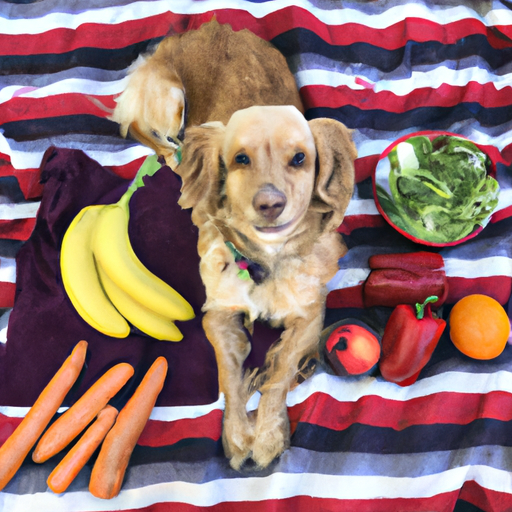As a caregiver, your furry friend’s health is of utmost importance to you. One of the key elements of their health revolves around their diet. While you might be tempted to share your food with your pet dog, it’s crucial to know what’s safe for them to consume. Let’s dive into the world of human food for dogs.
1. Foods that are Safe for Dogs
The following list consists of human foods that are generally safe for dogs to consume:
- Carrots: These vegetables are a great low-calorie snack that is high in fiber and vitamin A. They are also beneficial for a dog’s dental health.
- Fish: Fish like salmon and tuna are good sources of protein and omega-3 fatty acids, which can help keep a dog’s immune system strong.
- Blueberries: They are a superfood packed with antioxidants, which are beneficial for dogs.
- Peanut Butter: It’s a favorite treat of many canines. Not only is it a good source of protein, but it also contains heart-healthy fats, vitamin B, niacin, and vitamin E.
2. Foods Dogs Should Avoid
There are certain human foods that can be harmful or even fatal to dogs. Here are some to avoid:
- Chocolate: It contains theobromine which is toxic to dogs.
- Grapes and Raisins: These can cause kidney failure in dogs.
- Onions and Garlic: They can damage a dog’s red blood cells, leading to anemia.
3. Foods to be Given in Moderation
Some foods are safe for dogs but should be given in moderation:
- Dairy Products: While some dogs can tolerate milk and cheese, others may experience digestive problems.
- Bread: Plain bread is safe for dogs to eat, but it doesn’t offer any health benefits.
4. Preparing Safe Foods for Dogs
When preparing these foods for your dog, keep these points in mind:
- Always cook fish before serving it to your dog.
- Avoid adding salt, seasoning, or sauces to the food.
- Cut vegetables and fruits into bite-sized pieces to avoid choking hazards.
5. Understanding Dogs’ Nutritional Needs
It’s essential to understand that dogs have different nutritional needs compared to humans. Here’s a brief overview:
| Nutrient | Importance for Dogs |
|---|---|
| Protein | Essential for growth and repair |
| Carbohydrates | Provide energy |
| Fats | Support skin and coat health |
| Vitamins | Necessary for various body functions |
| Minerals | Aid in bone and teeth formation |
6. When to Consult a Vet
If you’re unsure about feeding your dog a particular food, or if your dog has consumed something harmful, always consult your vet. Signs that your dog may have consumed harmful food include vomiting, diarrhea, loss of appetite, and lethargy.
7. Key Takeaways
In conclusion, while some human foods can be a healthy addition to your dog’s diet, others can be harmful. Always do your research before introducing a new food to your dog’s diet and consult your vet if needed.
8. Frequently Asked Questions
Q: Can dogs eat fruits?
A: Yes, many fruits are safe for dogs to eat, like apples, bananas, and blueberries. However, fruits like grapes and cherries are toxic to dogs.
Q: Can dogs eat eggs?
A: Yes, eggs are safe for dogs to eat. They’re a great source of protein. However, they should be cooked to avoid risk of salmonella.
Q: Can dogs eat meat?
A: Yes, meat is a great source of protein for dogs. However, it should always be cooked and unseasoned.
Q: Can dogs eat nuts?
A: Some nuts, like peanuts and cashews, are safe for dogs to eat in moderation. However, others like almonds, pecans, and walnuts can be harmful.
By keeping these points in mind, you can ensure your dog’s diet is not only satisfying but safe and nutritious too. After all, our furry friends deserve the best care we can provide.



